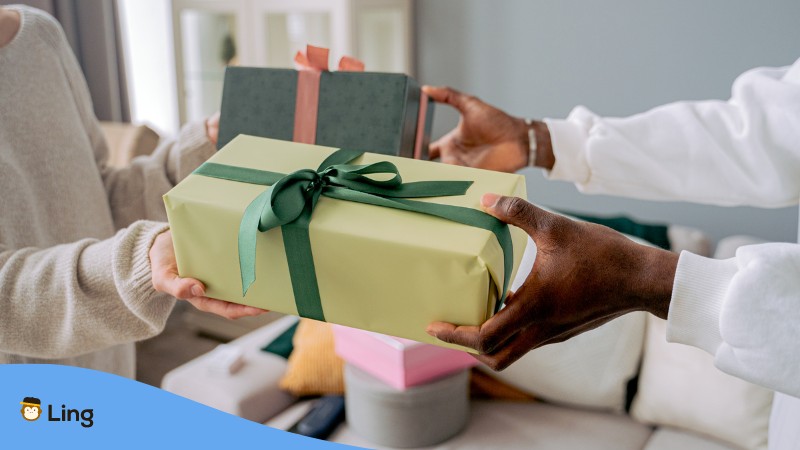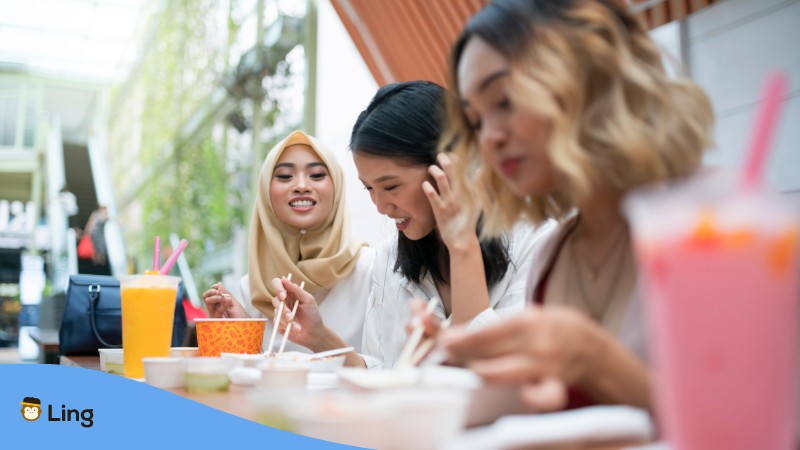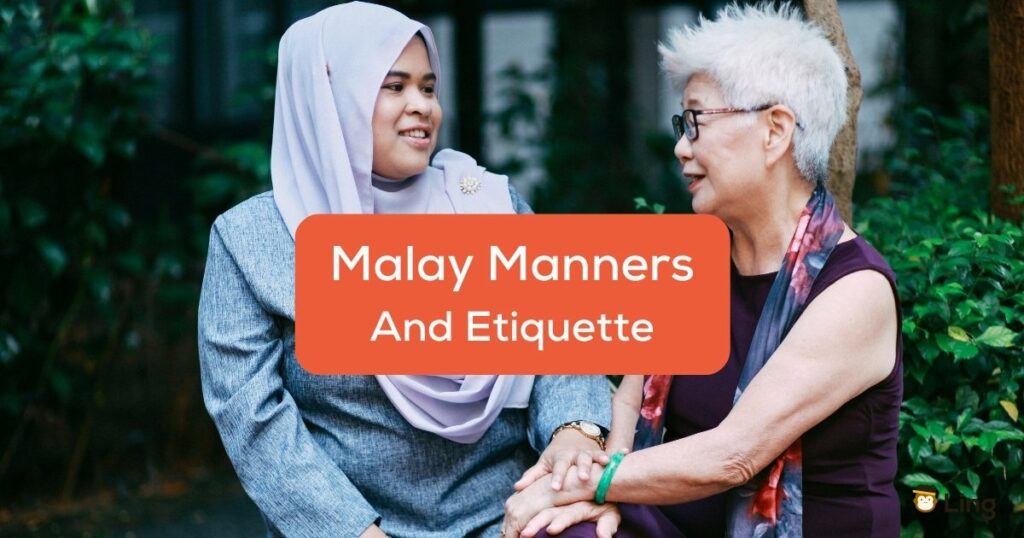If you’re planning a trip to Malaysia or doing business there, it’s essential to be aware of Malay manners and etiquette. These customs and traditions play a big role in Malaysian culture and can greatly impact your relationships with the locals. Whether it’s how you communicate, give gifts, or even just your body language, it’s important to know what’s considered respectful and appropriate.
So join me as we look into the key aspects of Malay manners and etiquette, including body language, gift-giving, and more. We’ll also go through the Malay words that you can use when speaking with the locals.
Malay Manners And Etiquette
1. Body Language
Let’s start with body language, which is a big deal in Malaysian culture. It’s a way of communicating without actually saying anything and can make or break a situation. For instance, when you’re talking to someone higher up or older, you must show respect through your body language. That means not making direct eye contact and keeping your tone of voice soft.
Physical Contact
One thing to remember is to avoid being too touchy-feely when communicating with others, especially people of the opposite sex. Also, be mindful of your hand gestures and facial expressions – you don’t want to come across as too excited or aggressive.
Using Of Left-Hand
Also, there’s a thing with the left hand in Malaysia. In many cultures, the left hand is considered unclean because it’s used for personal hygiene. So, it’s considered rude to use your left hand to touch someone or eat food – it can be interpreted as a lack of respect.
Avoid Negative Body Language
When receiving bad news, reacting with open displays of emotion or negative body language is also considered rude. Malaysians believe in maintaining harmony and saving face, even in difficult situations, and prefer to respond carefully and thoughtfully.
2. The Etiquette Of Greetings In Malaysia
Greeting etiquette is essential to social interaction in Malaysia and reflects the country’s diverse culture and traditions. Here’s how Malaysians greet others:
- Handshakes: A handshake is a common traditional Malay greeting, especially in business settings. Use a firm grip and make eye contact when shaking hands.
- Bowing: A slight bow of the head is a sign of respect and can be used when greeting someone older or of higher social status.
- Salutations: The use of formal titles, such as ”Encik” or “Cik” (Mr. or Ms.), is typical in Malaysia and shows respect. When addressing someone, use the correct title and last name.
- Ladies first: When introducing people in Malaysia, it’s customary to introduce women before men. For Western women, greeting Malay men with a nod and a smile is appropriate.
- Respect for personal space: Malaysians tend to keep a comfortable distance when interacting with others, and respecting their personal space is important. When greeting someone, it’s best to stand or sit at a reasonable distance and avoid physical contact unless initiated.

3. Gift Wrapping And Gift Giving In Malaysia
Gift-giving is a common and crucial cultural aspect in Malaysia. It is seen as a way to show respect, appreciation, and gratitude towards someone. When giving gifts, it’s always best to go for something practical and useful rather than something flashy or expensive.
For example, a box of traditional Malaysian sweets or local delicacies is always well appreciated. If you’re not sure what to give, it’s always safe to opt for something like a gift basket filled with local treats and snacks. Here are some tips for gift-giving and gift-wrapping in Malaysia:
- Choose an appropriate gift: Consider the person’s interests, tastes, and cultural background when choosing a gift.
- Wrap gifts nicely: Choose a wrap suitable for the occasion and the recipient, and make sure it’s neat and tidy.
- Use both hands: When giving a gift, it’s considered polite to use the right hand only or both hands as a sign of respect.
- Avoid certain colors: Avoid giving gifts in black or white wrapping paper, as these colors are associated with mourning. Also, avoid yellow wrapping paper because this is for royal family members only. Red or green is a safe choice.
- Perfect timing: Giving gifts at the end of a visit or after a meal is customary to say goodbye and express gratitude.
- Give a card: A card is an excellent addition to any gift and allows you to express your feelings. Choose a card appropriate for the occasion and the recipient, and take the time to write a personalized message.
4. Malaysian Communication Style
Malaysians have a unique communication style shaped by their culture, values, and traditions. Here are some critical aspects of the Malaysian communication style and some tips to help you understand them:
Respect For Elders
Malaysians show respect for their elders and those in positions of authority. This is demonstrated through the use of honorifics in speech, such as using “Datuk” or “Tuan” (sir) and “Puan” (ma’am) when addressing someone older or in a higher position. When speaking to elders or those in authority, adopt a respectful tone and body language, such as making eye contact and avoiding crossing your legs or arms.
Indirect Communication
Malaysians are known for their indirect communication style, which can sometimes confuse those from cultures that emphasize direct communication. For example, rather than saying “Tidak” or no directly, Malaysians may use indirect language or nonverbal cues to indicate their disagreement. To avoid misunderstandings, pay attention to the nuances of what’s being said and ask clarifying questions if necessary.
Avoiding Confrontation
Malaysians value harmony in their relationships and generally avoid confrontation. They may not say what they really think to avoid upsetting someone or causing conflict. As a result, it’s important to read between the lines and be attuned to nonverbal cues, such as facial expressions and body language, to understand what someone is really thinking or feeling.
Importance Of Face
Malaysians strongly emphasize “face,” which refers to a person’s social status and reputation. They may avoid saying or doing anything that would cause someone to lose face. For example, they may not openly criticize or challenge someone in public, even if they disagree. To avoid causing someone to lose face, be mindful of your tone and choice of words and avoid making negative or critical comments.

5. Eating Manners In Malaysia
The food culture in Malaysia is influenced by its rich cultural diversity, including Malay, Chinese, Indian, and other ethnic groups. Let me highlight some eating manners in Malaysia for you:
- Sharing is caring: Eating in Malaysia is often a communal experience, with people sharing dishes and passing food around the table. This is a way of building social connections and showing hospitality to guests.
- Use of chopsticks: Many Malaysians use chopsticks, especially when consuming their dishes. Use the utensils provided but remember to avoid pointing or waving chopsticks in the air since it is considered rude.
- No waste: Malaysians are mindful of food waste and generally avoid leaving food on their plate. This shows respect for the effort and resources in preparing the meal.
- Spicy food: Malaysian cuisine is known for its spicy food, and chili is often used to flavor dishes. If you’re not a fan of spicy food, be sure to let your host know, and they may be able to accommodate you.
- Ramadan: During the Muslim holy month of Ramadan, many Malaysians fast from sunrise to sunset. Eating and drinking in public during this time is generally avoided, and restaurants may close earlier or offer limited menus.
6. Dress Code In Malaysia
In Malay manners and etiquette, what you wear can reflect your respect for local customs and culture, so be mindful of local dress codes and Malay clothing in general.
For Men
Regarding men’s attire, casual or semi-casual clothing is generally acceptable. However, it’s best to avoid clothing that is too revealing or casual, such as shorts or flip-flops, especially when visiting Malay temples. If you’re attending a formal event, like business meetings, or visiting a cultural or religious site. Then it’s recommended to wear long pants and a collared shirt. This shows that you’re taking the occasion seriously and respecting local customs and traditions.
For Women
Modest clothing is the norm for Malay women. This can include long skirts or dresses, or pants and a blouse. Avoid clothing that is too revealing, such as short skirts or low-cut tops, as this can be seen as disrespectful. Women should also cover their arms and legs when visiting religious sites, mosques, or temples. Sometimes, women must cover their heads and wear a hijab or headscarf.
Useful Malaysian Phrases
When visiting or conducting business in Malaysia, it’s always helpful to know some basic and conversational Malay phrases to use in daily conversations. Here’s a list of greetings, basic conversation starters, and their pronunciation to help you make a good impression.
| English | Malaysian | Pronunciation |
| Hello | Selamat sejahtera | seh-lah-mat seh-jah-teh-rah |
| Good morning | Selamat pagi | seh-lah-mat pah-gee |
| Good afternoon | Selamat tengah hari | seh-lah-mat ten-gah har-ree |
| Good evening | Selamat petang | seh-lah-mat peh-tahng |
| Excuse me | Maaf | mah-af |
| How are you? | Apa khabar? | ah-pah kah-bar |
| Fine, thank you | Baik, terima kasih | bye-k, teh-ree-mah kah-sih |
| Yes, please | Ya, sila | yah, see-lah |
| No, thank you | Tidak, terima kasih | tee-dak, teh-ree-mah kah-sih |

Learn Malay With Ling
These are just some of the key aspects of Malay manners and etiquette. Remember that being mindful of these customs and respecting local culture will help you make a positive impression and have a great experience in Malaysia.
And if you want to sharpen your language skills, do it with the Ling app! As one of the best free language learning apps, Ling can help you master a new language in just 15 minutes a day. With interactive lessons and fun activities, you’ll have a blast while expanding your language skills.
Download from App Store or Google Play now to start learning Malay like a pro!



































































